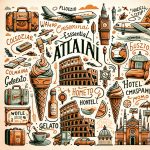When traveling to Italy, it’s essential to familiarize yourself with some key Italian phrases that will help you navigate the country with ease. Whether you’re exploring the charming streets of Florence, dining in a bustling trattoria in Rome, or seeking assistance in Venice, speaking a few words in Italian can significantly enhance your travel experiences.
In this article, we’ll explore the importance of learning Italian phrases for travel and how they can positively impact your interactions with locals and overall cultural immersion.
Learning basic Italian greetings and pleasantries allows travelers to initiate conversations and form connections with locals more effectively. Being able to say “buongiorno” (good morning), “ciao” (hello/goodbye), “per favore” (please), “grazie” (thank you), and “prego” (you’re welcome) in Italian can go a long way in setting a positive tone for interactions. Additionally, having a grasp of transportation-related phrases such as asking for directions or purchasing tickets ensures a smoother travel experience throughout Italy.
By delving into essential Italian phrases for dining out, accommodations, shopping, emergencies, and cultural interactions, travelers can feel more confident and prepared when engaging with locals and navigating various aspects of their journey. Embracing the language allows for a deeper connection with Italy’s rich culture and traditions while fostering mutual respect and understanding between travelers and locals.
As we delve into this article’s comprehensive guide on Italian phrases needed for travel, you’ll discover how even a small effort to learn the language can significantly enrich your adventures in Italy.
Greetings and Pleasantries
When traveling to Italy, it is important to familiarize yourself with essential Italian greetings and pleasantries. Knowing how to say “hello”, “goodbye”, “please”, “thank you”, and “you’re welcome” in Italian can go a long way in starting conversations with locals and showing respect for the local culture. Italians value politeness, so using these basic phrases can help you make a positive impression and enhance your travel experiences.
One of the most common greetings in Italian is “Ciao,” which translates to both “hello” and “goodbye.” This versatile word is used in both formal and informal settings. Another essential phrase is “Per favore,” which means “please.” Whether you’re asking for directions or ordering at a restaurant, using this word shows courtesy and consideration. Similarly, saying “Grazie” (thank you) and “Prego” (you’re welcome) are simple ways to express gratitude and acknowledge kindness from others.
Learning these basic Italian greetings not only helps with communication but also fosters meaningful connections with locals during your travels. By taking the time to learn and use these phrases, you demonstrate a genuine interest in the Italian language and culture, which can lead to more enriching travel experiences. Familiarizing yourself with these pleasantries will also make navigating daily interactions smoother and more enjoyable throughout your time in Italy.
Transportation
Italian transportation phrases are essential for navigating the country’s public transport networks and ensuring a smooth travel experience. Whether using buses, trains, or other forms of transportation, being able to communicate in Italian can help travelers ask for directions, understand schedules, and purchase tickets with ease.
When traveling in Italy, it is helpful to know how to ask for directions and assistance in Italian. Phrases such as “Dov’è la stazione?” (Where is the station?), “Come posso arrivare a ” (How can I get to ), and “Mi può aiutare per favore?” (Can you help me please?) can be incredibly valuable when trying to find your way around a new city or location.
In addition to asking for directions, knowing transportation vocabulary in Italian is important for purchasing tickets and understanding travel schedules. Words such as “biglietto” (ticket), “partenza” (departure), “arrivo” (arrival), and “orario” (schedule) are just a few examples that can assist travelers in efficiently navigating public transportation systems.
| Italian Phrase | English Translation |
|---|---|
| Dov’è la stazione? | Where is the station? |
| Come posso arrivare a | How can I get to |
| Mi può aiutare per favore? | Can you help me please? |
By learning these key phrases and vocabulary related to transportation, travelers can feel more confident when using public transport in Italy, ultimately leading to a more enjoyable and stress-free travel experience.
Dining Out
When traveling to Italy, dining out is a major part of the experience. It’s important to know some essential Italian phrases to navigate ordering food and drinks, as well as expressing dietary preferences and dealing with the check at the end of a meal.
Here are some useful Italian phrases for dining out:
- “Un tavolo per due, per favore.” (A table for two, please).
- “Il menu, per favore.” (The menu, please).
- “Vorrei ordinare ” (I would like to order ).
- “Sono vegetariano/a” (I am vegetarian) or “Sono allergico/a ” (I am allergic to ).
- “Il conto, per favore.” (The check, please).
– “Grazie.” (Thank you.)
Knowing these phrases can make dining out in Italy a more enjoyable and stress-free experience. Whether you’re discussing dietary restrictions with a server or paying at the end of your meal, being able to communicate in Italian will enhance your dining experience.
Additionally, it’s important to be aware of tipping customs in Italy. In many cases, a service charge is already included in the bill. However, it’s still common to leave a small amount of change as a tip if you’re satisfied with the service. Understanding how to ask for the check and leave a tip appropriately will help you navigate dining out in Italy with ease.
Accommodations
Checking in and out of a hotel in Italian
When checking into a hotel in Italy, it’s important to know some basic Italian phrases to ensure a smooth check-in process. Saying “Buongiorno” (good morning) or “Buonasera” (good evening) to the front desk staff is a respectful way to start the conversation.
You can then proceed with “Ho una prenotazione” which means “I have a reservation”, followed by providing your name and any necessary details. When checking out, you can say “Vorrei pagare la mia camera” which translates to “I would like to pay for my room”.
Vocabulary for discussing room amenities and making special requests
Being able to communicate about room amenities and make special requests in Italian can greatly enhance your accommodation experience. Learning words such as “aria condizionata” (air conditioning), “lavanderia” (laundry), or “ascensore” (elevator) can help you inquire about specific amenities. If you have any special requests, such as needing extra towels or pillows, you might want to use phrases like “Potrei avere delle asciugamani aggiuntive per favore?” which means “Could I have some additional towels please?”.
How to address maintenance issues or ask for help with accommodations in Italian
In the event that you encounter any maintenance issues during your stay at a hotel in Italy, it’s important to be able to communicate this effectively. Phrases such as “C’è un problema con la doccia” (There is a problem with the shower) or “La luce non funziona” (The light is not working) can help you convey the issue to the hotel staff.
Additionally, knowing how to ask for assistance with accommodations, such as saying “Mi scusi, potrebbe aiutarmi?” (Excuse me, could you help me?) can be helpful in various situations during your stay.
Shopping
When traveling in Italy, shopping at the local markets and stores can be a delightful experience. However, it’s important to know how to communicate your needs and preferences in Italian to make the most of your shopping experience.
Useful Phrases for Bargaining
In some markets and smaller shops in Italy, bargaining is common. To negotiate prices or ask for a discount, it’s helpful to know phrases such as “Qual è il prezzo migliore?” which means “What is the best price?” or “Posso avere uno sconto?” which translates to “Can I have a discount?”.
Asking for Sizes, Colors, and Prices
When shopping for clothing or other items, it’s essential to be able to communicate your preferences. Knowing how to ask for different sizes and colors, as well as understanding responses from the store attendants will make your shopping experience smoother. For example, “Avete questo vestito nella mia taglia?” means “Do you have this dress in my size?” while “Quanto costa?” means “How much does it cost?”.
Expressing Satisfaction or Dissatisfaction with Purchases
Whether you’re thrilled with a purchase or need to express dissatisfaction, knowing how to do so politely in Italian is important. You can say “Sono molto contento/a del mio acquisto” when you are very happy with your purchase or “Non sono soddisfatto/a di questo articolo” if you are not satisfied with an item.
By familiarizing yourself with these Italian phrases for shopping, you’ll be better equipped to navigate the local markets and stores during your travels in Italy.
Emergencies
When traveling to Italy, it’s important to be prepared for any emergencies that may arise. Knowing some key Italian phrases can help you seek help and communicate effectively in these situations. Here are some essential phrases for emergencies:
- “Aiuto.” – This means “Help.” and can be used to attract attention in a time of need.
- “Ho bisogno di un dottore” – If you need medical assistance, this phrase translates to “I need a doctor”.
- “Ho perso il mio passaporto” – If you lose your passport, use this phrase to report a lost or stolen item.
In addition to seeking medical or legal assistance, it’s important to be able to describe symptoms or injuries if necessary. Here are some vocabulary words related to medical emergencies:
– “Mal di testa” – Headache
– “Dolore allo stomaco” – Stomach pain
– “Ferita” – Injury
Having these phrases and vocabulary at the ready can make a big difference in navigating emergency situations while traveling in Italy. It’s always best to hope for the best but prepare for the worst, so take some time before your trip to familiarize yourself with these important terms.
Cultural Interactions
When traveling to Italy, it is important to be culturally sensitive and respectful in your interactions with locals. Learning key Italian phrases for engaging with locals and learning about the culture can enhance your travel experience and show appreciation for the customs and traditions of the country. By demonstrating curiosity and interest in Italian customs and traditions, you can create meaningful connections with locals and gain a deeper understanding of the culture.
One of the best ways to engage with locals is to use respectful Italian phrases that express curiosity and interest. Simple phrases such as “scusi, posso chiedere una domanda?” (excuse me, may I ask a question?) or “mi potrebbe raccontare di questa tradizione?”
(could you tell me about this tradition?) can show that you are genuinely interested in learning about the local culture. As a result, locals are more likely to open up to you and share their knowledge with you.
Additionally, when interacting with locals in Italy, it is important to demonstrate appreciation and gratitude for cultural experiences. Saying “grazie per aver condiviso questo con me” (thank you for sharing this with me) or “è stato un’esperienza memorabile” (it was a memorable experience) can convey your gratitude for the opportunity to learn about Italian customs and traditions. By showing respect and appreciation through these phrases, you can foster positive cultural interactions during your travels in Italy.
Conclusion
In conclusion, learning Italian phrases for travel is essential for anyone planning to visit Italy. Being able to communicate in the local language not only makes it easier to navigate everyday interactions, but it also enhances cultural experiences. By using Italian greetings, ordering food and drinks, asking for directions, and engaging with locals in their native language, travelers can show respect for the country they are visiting and have more meaningful interactions with the people they meet.
I encourage readers to take the time to practice and use the Italian phrases provided in real-life travel situations. Whether it’s on public transportation, at a restaurant, or when seeking help in an emergency, using even just a few words of Italian can make a difference in how you are perceived as a visitor. It shows that you’ve made an effort to understand and connect with the local culture, which is often appreciated by locals.
For those looking to further enhance their Italian language skills for travel, there are plenty of resources available. From language learning apps and online courses to phrasebooks and conversation guides, there are many ways to continue practicing and expanding your knowledge of Italian before your trip. With dedication and persistence, mastering basic Italian phrases can greatly enrich your travel experiences in Italy.
Frequently Asked Questions
What phrases to know when traveling to Italy?
When traveling to Italy, it’s helpful to know some key phrases to navigate your way around. Useful phrases include “Ciao” for hello and goodbye, “Grazie” for thank you, “Per favore” for please, “Dov’è il bagno?” for where is the bathroom, and “Parli inglese?” for do you speak English.
How to learn Italian phrases for travel?
There are a few ways to learn Italian phrases for travel. You can take a course or use language learning apps like Duolingo or Rosetta Stone that offer basic Italian lessons. Another way is to immerse yourself in Italian culture by watching Italian movies or TV shows with subtitles to pick up commonly used phrases in context.
What do Italians say instead of Bon Voyage?
Instead of saying Bon Voyage, Italians often say “Buon Viaggio” which translates directly to have a good trip or safe journey. This phrase is commonly used when bidding someone farewell before they embark on a trip. It’s a polite and kind sentiment shared among Italians when someone they know is traveling.

I’m a passionate traveler, writer, and Italophile. My fascination with Italy’s history, art, and culture has led me on countless adventures across the Italian landscape. Through “I Live Italy,” I share my love for this extraordinary country and aims to inspire others to explore its boundless beauty.





